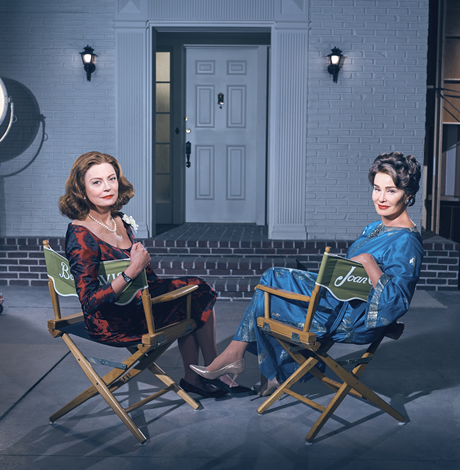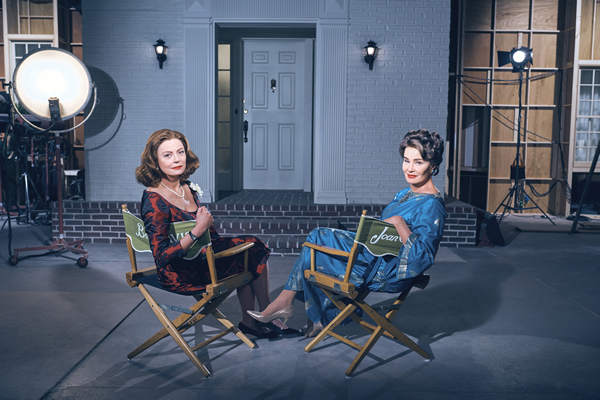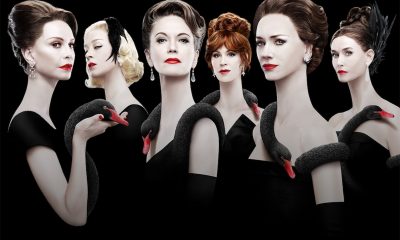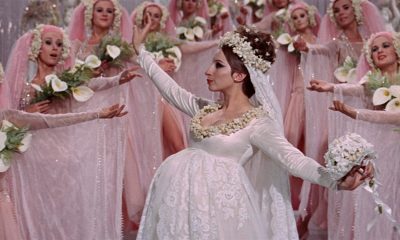Arts & Entertainment
Bette and Joan forever
New series ’Feud’ delights, but only to a point


Susan Sarandon, left, as Bette Davis and Jessica Lange as Joan Crawford in ‘Feud: Bette and Joan,’ a new FX series. (Photo courtesy FX)
This Sunday night, grab your popcorn and sit back to enjoy one of the greatest catfights in Hollywood history.
Ryan Murphy (“Glee” and “American Horror Story,” among many others) turns his focus on the legendary “Feud” between iconic actresses Joan Crawford (Jessica Lange) and Bette Davis (Susan Sarandon). Billed as an anthology series, “Feud: Bette and Joan” premieres Sunday, March 5 and runs eight consecutive weeks on FX at 10 p.m.
As Olivia de Havilland (Catherine Zeta Jones) and Joan Blondell (Kathy Bates) reveal in delightful cameos that serve as barely concealed exposition, it’s a tough time for aging actresses in Hollywood in 1961. Marilyn Monroe is in her ascendancy; studio moguls are scared of television and desperate for younger audiences, actresses are considered “over the hill” at an age when their male counterparts are just starting to look “distinguished.”
After a series of failed television pilots, Academy Award-winning actress Joan Crawford decides to take matters into her own hands. She sends journeyman director Robert Aldrich a copy of the just-released novel “Whatever Happened To Baby Jane?,” a horror story about two reclusive sisters who were both actresses. Despite years of tension between them, Crawford asks Bette Davis, also fallen on hard times in Hollywood, to be her co-star.
The rest is Hollywood history: verbal and physical fights on the set, a battle over the Academy Award and a grudge match that lasted until Crawford’s death in 1977. Murphy and his stable of writers and directors mine this comic material for all its worth; Murphy’s Hollywood geekery is on delicious full display.
The team also captures the dark side of Tinseltown: the ageism and sexism that cuts down these two stellar actresses who are still in their prime and the ruthless way studio head Jack L. Warner (Stanley Tucci), feckless director Robert Aldrich (Alfred Molina) and vicious gossip columnist Hedda Hopper (Judy Davis) manipulate the pair for their own gain. They also capture the self-destructive and self-dramatizing tendencies of the two fading stars who are desperate to stay in the public eye and pay the bills.
There is unfortunately a basic problem with the material. After a while, it starts wearing thin. Murphy and his team also seem to miss a lot of opportunities. They capitalize on the presence of “Baby Jane” co-star Victor Buono (Dominic Burgess), a gay man who idolizes Davis, who bails him out after he is caught in a police raid at a gay cruising ground.
But, gossip columnist Louella Parsons is reduced to a voice on the telephone, even though her bitter rivalry with Hopper would seem to offer a handy mirror to the Crawford-Davis feud. Christina Crawford, who is trying to launch her own acting career, also remains unseen.
Nevertheless, the actors have a wonderful time with the script at hand. Both Lange and Sarandon are great fun as Crawford and Davis, chewing scenery to their hearts’ content and trying not to wallow too much during their lingering dewy-eyed close-ups. And love or hate “Mommie Dearest,” it’s nice to have another Crawford screen interpretation of Crawford besides Faye Dunaway’s.
Tucci and Davis roar through the script and energize their scenes. Molina is great as the long-suffering director caught between his producers, his stars and his own philandering. With her dry delivery and pitch-perfect physical comedy, Jackie Hoffman nearly steals the show as Mamacita, Crawford’s German maid.
Despite this star power, the real find of the series is Burgess, whose layered performance as the quirky and proudly gay Buono gives the series a grounding it often lacks. The growing friendship between Davis and Buono is a highlight and hopefully Buono’s Oscar nomination for “Baby Jane” will be mirrored by Burgess’ Emmy win for “Feud.”

Team DC, the umbrella organization for LGBTQ-friendly sports teams and leagues in the D.C. area, held its annual Night of Champions Awards Gala on Saturday, April 20 at the Hilton National Mall. The organization gave out scholarships to area LGBTQ student athletes as well as awards to the Different Drummers, Kelly Laczko of Duplex Diner, Stacy Smith of the Edmund Burke School, Bryan Frank of Triout, JC Adams of DCG Basketball and the DC Gay Flag Football League.
(Washington Blade photos by Michael Key)




















The 2024 National Cannabis Festival was held at the Fields at RFK Stadium on April 19-20.
(Washington Blade photos by Michael Key)
















Covering the @NatlCannaFest at RFK Stadium for @WashBlade . Stop by the LGBTQ+ booth and pick up a paper if you are here. pic.twitter.com/is7hnsaPns
— Michael Patrick Key (@MichaelKeyWB) April 20, 2024
Theater
‘Amm(i)gone’ explores family, queerness, and faith
A ‘fully autobiographical’ work from out artist Adil Mansoor

‘Amm(i)gone’
Thorough May 12
Woolly Mammoth Theatre
641 D St., N.W.
$60-$70
Woollymammoth.net
“Fully and utterly autobiographical.” That’s how Adil Mansoor describes “Amm(i)gone,” his one-man work currently playing at Woolly Mammoth Theatre.
Both created and performed by out artist Mansoor, it’s his story about inviting his Pakistani mother to translate Sophocles’s Greek tragedy “Antigone” into Urdu. Throughout the journey, there’s an exploration of family, queerness, and faith,as well as references to teachings from the Quran, and audio conversations with his Muslim mother.
Mansoor, 38, grew up in the suburbs of Chicago and is now based in Pittsburgh where he’s a busy theater maker. He’s also the founding member of Pittsburgh’s Hatch Arts Collective and the former artistic director of Dreams of Hope, an LGBTQ youth arts organization.
WASHINGTON BLADE: What spurred you to create “Amm(i)gone”?
ADIL MANSOOR: I was reading a translation of “Antigone” a few years back and found myself emotionally overwhelmed. A Theban princess buries her brother knowing it will cost her, her own life. It’s about a person for whom all aspirations are in the afterlife. And what does that do to the living when all of your hopes and dreams have to be reserved for the afterlife?
I found grant funding to pay my mom to do the translation. I wanted to engage in learning. I wanted to share theater but especially this ancient tragedy. My mother appreciated the characters were struggling between loving one another and their beliefs.
BLADE: Are you more director than actor?
MANSOOR: I’m primarily a director with an MFA in directing from Carnegie Mellon. I wrote, directed, and performed in this show, and had been working on it for four years. I’ve done different versions including Zoom. Woolly’s is a new production with the same team who’ve been involved since the beginning.
I love solo performance. I’ve produced and now teach solo performance and believe in its power. And I definitely lean toward “performance” and I haven’t “acted” since I was in college. I feel good on stage. I was a tour guide and do a lot of public speaking. I enjoy the attention.
BLADE: Describe your mom.
MANSOOR: My mom is a wonderfully devout Muslim, single mother, social worker who discovered my queerness on Google. And she prays for me.
She and I are similar, the way we look at things, the way we laugh. But different too. And those are among the questions I ask in this show. Our relationship is both beautiful and complicated.
BLADE: So, you weren’t exactly hiding your sexuality?
MANSOOR: In my mid-20s, I took time to talk with friends about our being queer with relation to our careers. My sexuality is essential to the work. As the artistic director at Dreams of Hope, part of the work was to model what it means to be public. If I’m in a room with queer and trans teenagers, part of what I’m doing is modeling queer adulthood. The way they see me in the world is part of what I’m putting out there. And I want that to be expansive and full.
So much of my work involves fundraising and being a face in schools. Being out is about making safe space for queer young folks.
BLADE: Have you encountered much Islamophobia?
MANSOOR: When 9/11 happened, I was a sophomore in high school, so yes. I faced a lot then and now. I’ve been egged on the street in the last four months. I see it in the classroom. It shows up in all sorts of ways.
BLADE: What prompted you to lead your creative life in Pittsburgh?
MANSOOR: I’ve been here for 14 years. I breathe with ease in Pittsburgh. The hills and the valleys and the rust of the city do something to me. It’s beautiful, it’ affordable, and there is support for local artists. There’s a lot of opportunity.
Still, the plan was to move to New York in September of 2020 but that was cancelled. Then the pandemic showed me that I could live in Pittsburgh and still have a nationally viable career.
BLADE: What are you trying to achieve with “Amm(i)gone”?
MANSOOR: What I’m sharing in the show is so very specific but I hear people from other backgrounds say I totally see my mom in that. My partner is Catholic and we share so much in relation to this.
I hope the work is embracing the fullness of queerness and how means so many things. And I hope the show makes audiences want to call their parents or squeeze their partners.




















